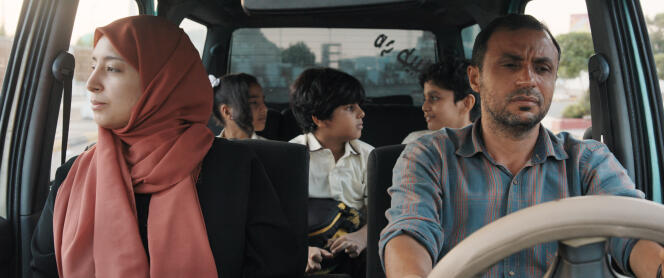THE “WORLD’S” OPINION – NOT TO BE MISSED
A film from Aden, Yemen’s old port located on the southwest tip of the Arabian Peninsula, is in itself a miracle. Most cinemas and theaters were closed by the Islamists following the reunification between the south and the north of the country in 1990. In the wake of the “Arab Spring”, in 2011, the southerners of Aden attempted to regain control, at the cost of a bloody civil war, in 2014, pitting the Houthis supported by Iran against the Yemeni government supported by Saudi Arabia – a new ceasefire agreement was signed in December 2023.
So, cinema, in all this, could seem insignificant. But, for Yemeni and southern director Amr Gamal, just 40 years old, the camera fulfills this urgent need to document. His second feature film, The Lights of Aden, selected for the Berlinale in 2023 (Panorama section), is a fascinating portrait of a city in a state of decay. Like this couple whose adventures we follow.
Journalist on public television, Ahmed (Khaled Hamdan), father of three children, has not been paid for two months and is working as a taxi driver in the meantime. His wife, Isra’a (Abeer Mohammed), is pregnant with a fourth, and it’s a disaster for them. No longer able to pay their rent, they are preparing to move into a shabby apartment. They also have to save to pay for private school, as the public service is no longer up to the task.
An unsuspected strength
Ahmed and Isra’a have only one fixed idea: to end this unwanted pregnancy. The film questions beliefs and the taboo of abortion, in a country where it is prohibited. Though. The sheikhs have different points of view, which they do not refrain from expressing on social networks. If some affirm that, from the first day, the embryo is a human being, others believe that abortion before the fortieth or hundred and twentieth day of pregnancy is not a sin. Some doctors take advantage of this uncertainty to provide clandestine abortions, paid handsomely. We will never know what awaits Ahmed and Isra’a, a worn-out couple united by destiny. The two actors carry the weariness on their faces with a disconcerting naturalness.
The husband and his wife come up against every wall, from the private clinic, where Isra’a is categorically refused, to the public hospital, where a close friend, Muna (Samah Alamrani), works as an obstetrician-gynecologist and considers the arrival of any child as a blessing. The director uses family conversations, the news on the radio, meetings in the taxi to create a buzzing atmosphere of crisis. At the side of a road, public television technicians dare to gather to protest, “mouths sewn shut” with red adhesive tape.
You have 25% of this article left to read. The rest is reserved for subscribers.
